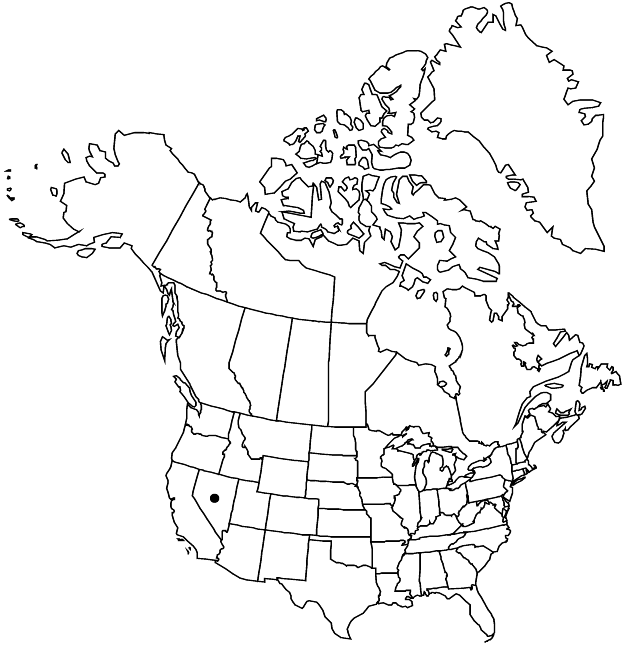familyPolygonaceae
subfamilyPolygonaceae subfam. Eriogonoideae
genusEriogonum
subgenusEriogonum subg. Ganysma
speciesEriogonum esmeraldense
Difference between revisions of "Eriogonum esmeraldense var. toiyabense"
Leafl. W. Bot. 6: 178. 1952.
Common names: Toiyabe wild buckwheat
Endemic
Treatment appears in FNA Volume 5. Treatment on page 393.
FNA>Volume Importer |
imported>Volume Importer |
||
| (2 intermediate revisions by one other user not shown) | |||
| Line 8: | Line 8: | ||
}} | }} | ||
|common_names=Toiyabe wild buckwheat | |common_names=Toiyabe wild buckwheat | ||
| + | |special_status={{Treatment/ID/Special_status | ||
| + | |code=E | ||
| + | |label=Endemic | ||
| + | }} | ||
|basionyms= | |basionyms= | ||
|synonyms= | |synonyms= | ||
| Line 24: | Line 28: | ||
|elevation=2100-3200 m | |elevation=2100-3200 m | ||
|distribution=Nev. | |distribution=Nev. | ||
| − | |discussion=<p>Variety toiyabense is totally isolated from all known populations of < | + | |discussion=<p>Variety toiyabense is totally isolated from all known populations of <i></i>var.<i> esmeraldense</i>. In Nye County, it is found in the Toiyabe, Toquima, and Monitor ranges, where it can be locally common. To the east and north, it is locally infrequent in the Shoshone (Lander County) and Independent mountains (Elko County). It may well be more widely distributed than reported here, and not worthy of its current “sensitive” status.</p> |
|tables= | |tables= | ||
|references= | |references= | ||
| Line 33: | Line 37: | ||
-->{{#Taxon: | -->{{#Taxon: | ||
name=Eriogonum esmeraldense var. toiyabense | name=Eriogonum esmeraldense var. toiyabense | ||
| − | |||
|authority=J. T. Howell | |authority=J. T. Howell | ||
|rank=variety | |rank=variety | ||
| Line 47: | Line 50: | ||
|publication title=Leafl. W. Bot. | |publication title=Leafl. W. Bot. | ||
|publication year=1952 | |publication year=1952 | ||
| − | |special status= | + | |special status=Endemic |
| − | |source xml=https:// | + | |source xml=https://bitbucket.org/aafc-mbb/fna-data-curation/src/2e0870ddd59836b60bcf96646a41e87ea5a5943a/coarse_grained_fna_xml/V5/V5_806.xml |
|subfamily=Polygonaceae subfam. Eriogonoideae | |subfamily=Polygonaceae subfam. Eriogonoideae | ||
|genus=Eriogonum | |genus=Eriogonum | ||
Latest revision as of 22:14, 5 November 2020
Plants (0.5–)1–3 dm. Aerial flowering stems sparsely glandular proximally. Inflorescence branches glandular proximally. Flowers 2–3 mm. Achenes 1.8–2.5 mm.
Phenology: Flowering Jun–Sep.
Habitat: Sandy to gravelly flats and slopes, saltbush, sagebrush, and mountain mahogany communities, pinyon-juniper and montane conifer woodlands
Elevation: 2100-3200 m
Discussion
Variety toiyabense is totally isolated from all known populations of var. esmeraldense. In Nye County, it is found in the Toiyabe, Toquima, and Monitor ranges, where it can be locally common. To the east and north, it is locally infrequent in the Shoshone (Lander County) and Independent mountains (Elko County). It may well be more widely distributed than reported here, and not worthy of its current “sensitive” status.
Selected References
None.
Lower Taxa
None.
... more about "Eriogonum esmeraldense var. toiyabense"
